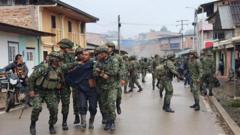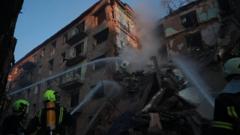As protests erupted across Kenya over government corruption and police brutality, the death toll has climbed to 16, with many injuries reported. The government's response has drawn criticism for its heavy-handed tactics and media restrictions.
Death Toll Rises in Kenya Amid Protests Against Government Corruption

Death Toll Rises in Kenya Amid Protests Against Government Corruption
Nationwide demonstrations highlighted citizens' grievances with police violence and corruption, leading to increased casualties and unrest.
Streets in Nairobi lay strewn with debris on Thursday following a day of protests that has left 16 people dead, according to a prominent human rights organization. Following large-scale demonstrations on Wednesday against government corruption and police brutality, protesters clashed with security forces who utilized live ammunition, rubber bullets, and tear gas to disperse the crowds.
Irũngũ Houghton, executive director of Amnesty Kenya, disclosed the updated death toll, primarily from gunshot wounds, which includes the tragic loss of Fred Wamale Wanyonyi, a security guard at Kenya Power's headquarters. Reports indicate that more than 400 individuals sustained injuries during the protests, with critical injuries affecting over 80 people.
According to the Independent Police Oversight Authority, a government body designed to hold police accountable, over 60 individuals have been arrested across nearly half of the country’s 47 counties. In various locations, local news outlets reported incidents of looting and arson targeting police stations, though the full extent of the violence remains unclear.
In the aftermath of the protests in the capital, banks and shops reopened under overcast skies and rain, while signs of unrest, including rocks and rubble, adorned the roadways. Many residents, wary of potential repercussions, refrained from discussing the protests. The government enforced a ban on live media coverage of the protests, a controversial decision condemned by media advocacy groups, and restricted the use of the messaging app Telegram.
These protests marked an anniversary of last year’s demonstrations, which left over 60 dead and resulted in numerous cases of enforced disappearances. The police have denied allegations of targeting protesters during previous unrest, while President William Ruto has claimed all disappeared individuals have returned home.
The ongoing grievances regarding economic struggles, persistent corruption, and police violence continue to fuel tensions among citizens, prompting heightened unrest as they seek accountability and reform from their government.




















